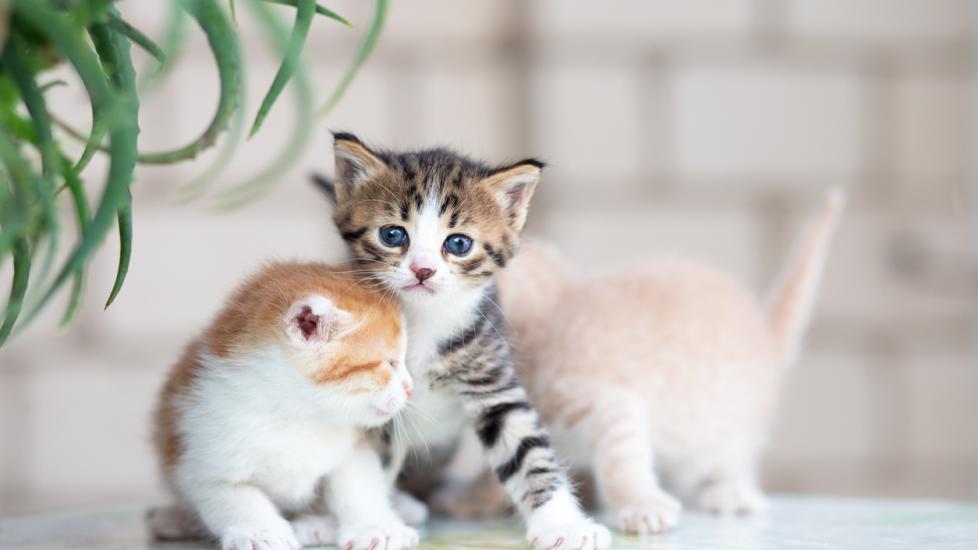Kitten Vaccination Schedule and Costs
Kittens are most susceptible to infectious diseases when they are under 6 months of age. That’s why it’s so important to give your kitten the protection they need with the right vaccinations.
Mother cats pass maternal antibodies through their milk during nursing. These antibodies do offer some degree of protection against diseases, but they also interfere with, or even inactivate, the body’s response to vaccination.
For this reason, core (recommended) kitten vaccinations start at 6-8 weeks of age and are boosted (repeated) every 3-4 weeks until the kitten is 16-20 weeks old. Core vaccines should be boosted one year after the initial series.
Core vs. Non-Core Kitten Vaccines
Cat vaccinations are divided into two types:
-
Core cat vaccinations are those that protect against especially common and/or particularly dangerous diseases, and they are recommended for all kittens and adult cats.
-
Non-core vaccinations are recommended only for those cats that are at high risk of infection. In the case of non-core vaccinations, your vet will assess your cat’s lifestyle to determine the risk of disease and whether it’s greater than the risk of vaccination.
-
Examples: FeLV and Bordetella
-
What Vaccines Does a Kitten Need?
There are two vaccines that should be given to all kittens, and a third vaccine is highly recommended by some veterinarians.
FVRCP
All kittens should receive a vaccination that protects against feline rhinotracheitis, feline calicivirus, and feline panleukopenia (FVRCP). These diseases are common in the general cat population.
Protection against all three of these viruses is generally provided in a combination vaccine.
-
Feline calicivirus is one of the most common viral causes of feline upper respiratory infections.
-
Feline viral rhinotracheitis is highly contagious between cats. It’s also a major cause of upper respiratory infections and is caused by feline herpes virus type 1. Cats that become infected will always be carriers of the virus.
-
Feline panleukopenia is also very contagious between cats and is caused by feline parvovirus.
The kitten vaccination schedule for FVRCP can begin as early as 6 weeks of age. Kittens are vaccinated once every 3-4 weeks until they reach 16 weeks of age or older. However, to avoid over-vaccination, most veterinarians will recommend starting the vaccine at 8 weeks of age, followed by boosters at 12 weeks and 16 weeks old.
Rabies
Rabies is the other core kitten vaccination. Rabies is a fatal disease that can affect cats and many other animals, including humans. Your kitten can receive a rabies vaccination as early as 12 weeks of age, but this depends on state laws and the veterinarian.
FeLV
The feline leukemia virus (FeLV) vaccine is recommended by some veterinarians for all kittens, while others only recommend it for kittens at risk of disease. The decision should be based on your pet’s lifestyle and a discussion with your vet.
Feline leukemia is a viral disease that can be transferred to kittens from their mother or through close contact with other infected cats. Kittens should be tested for FeLV prior to vaccination. Vaccination can begin at 8 to 12 weeks of age and requires a booster vaccine that’s given 3-4 weeks later.
Kitten Vaccination Schedule
Here’s the general schedule for kitten vaccinations:
-
6-8 weeks:
-
FVRCP required
-
FeLV highly recommended
-
-
10-12 weeks:
-
FVRCP required (second in series)
-
FeLV highly recommended
-
-
14-16 weeks:
-
FVRCP required (third in series)
-
Rabies required by law
-
FeLV highly recommended
-
-
1-year booster:
-
FVRCP booster required
-
Rabies booster required by law
-
Cost of Kitten Vaccines
Each vaccine costs roughly $25 to $50 depending on the manufacturer and where you live. Your kitten will also usually need a physical examination to make sure that they are healthy enough to get vaccines.
The initial examination is usually with the veterinarian, and follow-up exams are either with the vet or a certified technician. The cost for the initial exam can range from $40-$60 on average. The follow-up visit cost might be lower with a technician.
Find a CarePlus insurance plan to match your pet's needs
Learn about CarePlus, insurance plans with exclusive Chewy benefits
Kitten Vaccine Side Effects
Side effects of vaccinations are usually mild if they occur at all, although in rare instances, unexpected severe reactions can occur. Your veterinary team should discuss these possible issues with you so you know what to monitor for.
Mild side effects can include:
-
Tiredness
-
Mild fever
-
Soreness at the site of injection
-
Lump at the site of injection
Moderate side effects can include:
More severe side effects include:
-
Facial swelling
-
Hives on the body
-
Trouble breathing
-
Shock
Go to an emergency vet if you see any severe side effects.
If you have any concerns about your kitten after receiving vaccinations, contact your veterinarian or bring your pet in to see the vet. They will help determine if it is safe to continue with the vaccine series and may even recommend giving your cat an antihistamine ahead of time.
Featured Image: iStock.com/
